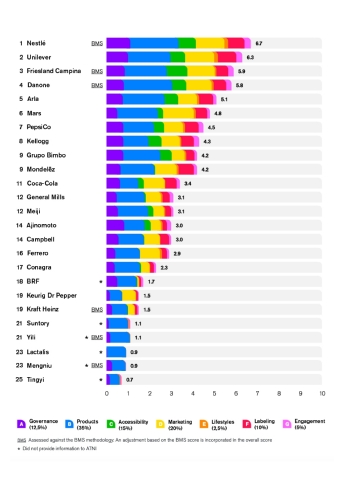Wereldwijde Access to Nutrition Index 2021 roept de voedingsbranche op om de voedingskloof in het COVID-19-tijdperk dringend aan te pakken
UTRECHT, Nederland–(BUSINESS WIRE)– Access to Nutrition Initiative (ATNI)heeft zijn Global Index 2021 gelanceerd, waarin de 25 grootste wereldwijde voedsel- en drankenfabrikanten worden beoordeeld op hun bijdragen aan het aanpakken van ondervoeding. Hoewel sommige bedrijven aanzienlijke vooruitgang hebben geboekt sinds de laatste iteratie in 2018, is de voortgang van de top 10 fabrikanten vertraagd. ATNI roept bedrijven dringend op om meer inspanningen te leveren om enkele van ‘s werelds grootste voedingsuitdagingen aan te pakken.
Ondervoeding, in welke vorm dan ook, treft alle landen ter wereld en draagt bij aan miljoenen dodenen mensen die het risico lopen op voedingsgerelateerde ziekten. In 2019 werden 690 miljoen mensen (8,9% van de wereldbevolking)als ondervoed beschouwd en met de economische effecten van COVID-19 zien we nog meer mensen extreme armoede ervaren en de gevolgen van overgewicht en voedingsgerelateerde ziekten.
Deze bekendmaking is officieel geldend in de originele brontaal. Vertalingen zijn slechts als leeshulp bedoeld en moeten worden vergeleken met de tekst in de brontaal, die als enige rechtsgeldig is.
Global Access to Nutrition Index 2021 Calls for Food Industry to Urgently Address Nutrition Gap in the COVID-19 Era
UTRECHT, The Netherlands–(BUSINESS WIRE)– Access to Nutrition Initiative (ATNI) has launched its 2021 Global Index, assessing the world’s 25 largest global food and beverage manufacturers and their contributions to addressing malnutrition. While some companies have shown significant progress since it’s last iteration in 2018, progress from the top 10 ranking manufacturers has slowed. ATNI is urgently calling on companies to step up efforts to tackle some of the world’s toughest nutrition challenges.

Global Access to Nutrition Index 2021 Final Ranking (Graphic: Business Wire)
Malnutrition in any form affects every county in the world, contributing towards millions of deaths and people at risk of diet related diseases. In 2019, 690 million people (8.9% of the global population) were considered undernourished, and with the economic effects of COVID-19 we’re seeing even more people experiencing extreme poverty and the consequences of overweight and diet-related diseases.
FCDO Minister for the European Neighbourhood and the Americas, Wendy Morton said: “We welcome the launch of this year’s Index, particularly as COVID-19 has worsened levels of malnutrition and the availability of food globally. We have a unique opportunity to address this in ways that benefit everyone. We must hold the world’s biggest food and beverage companies to account to help speed up our global recovery from the pandemic.”
Inge Kauer, Executive Director of ATNI, added, “As the 25 largest food and beverage manufacturers, each must take responsibility to deliver healthy product offerings to consumers across the globe and not leave nutrition behind. That’s no small task – but it’s one that requires action urgently if we are to deliver on the Sustainable Development Goals to end world hunger and ensure good health and well-being.”
Highlights and Rankings
All companies were assessed on their commitments, practices, and disclosure – with regards to governance and management, the production and distribution of healthy, affordable, accessible products, and how companies influence consumer choices and behavior.
- The average score remained the same as 2018: 3.3/10.
- Nestlé led the 2021 ranking with a score of 6.7. The company achieved a top-3 rank in all categories and ranked first on ‘Governance’, and ‘Engagement’.
- Unilever came second with 6.3, and FrieslandCampina third with 5.9.
- Arla showed a big improvement from 3.3 in 2018 to 5.1 in 2021, largely because of a new labeling policy, responsible marketing policies, and an improvement in healthiness of its product portfolio.
- Meiji rose four places, partially due to incorporation of a nutrition strategy in its CSR vision and new policies aimed at marketing to children and labeling.
- Only 31% of products met the independent health standard (a health star rating of 3.5 stars or more). This equates to 11,797 of the 38,176 distinct products sold by the 25 companies globally
- Just five companies were found to have half or more of their products meet the healthy threshold of 3.5 stars
- Nine companies improved the average HSR of their products between 2018 and 2021.
Contacts
Tom Dockar-Drysdale
Check out our twitter: @NewsNovumpr
